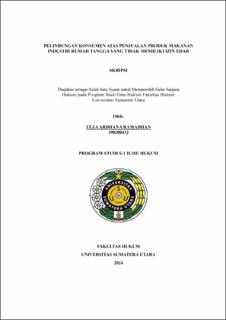| dc.description.abstract | Small and Medium Enterprises (SMEs), particularly the Home Food Industry (IRTP), play a vital role in the economy. However, they often operate without obtaining proper distribution permits. Food products from IRTPs, which are freely sold in the market, frequently fail to meet safety and quality standards, posing health risks to consumers. Therefore, it is crucial to establish strict and adequate legal protections for consumers, especially those consuming food that does not meet food safety standards. This thesis is titled “Consumer Protection for the Sale of Food Products from Home Industries Without Distribution Permits.” The objectives of this research are to: Examine the legal regulations regarding food production by Home Food Industries under Indonesian laws and regulations; Analyze the roles of the Food and Drug Supervisory Agency (BPOM) and the Ministry of Health in regulating and supervising food products from Home Food Industries; and Assess the legal consequences for business actors who produce food without obtaining distribution permits. This research adopts a normative juridical method, focusing on legal norms and conducted through library research to obtain secondary data, including primary, secondary, and tertiary legal materials relevant to the issues under study. This research is descriptive in nature. The findings of this legal study indicate that the legal regulations governing food production by Home Food Industries in Indonesia mandate compliance with food safety standards as stipulated in the Health Law. This includes the obligation to obtain a Home Industry Food Production Certificate (SPP-IRT), although certain products are exempted from the requirement to have a distribution permit. The Food and Drug Supervisory Agency (BPOM) and the Ministry of Health play essential roles in ensuring that these products are safe and healthy through supervision, issuance of distribution permits, and providing guidance to producers. Violations of these regulations may result in administrative, civil, or criminal sanctions, including warnings, distribution bans, destruction of hazardous products, fines, and the possibility of compensation claims from consumers. Business actors may face imprisonment of up to five years or a maximum fine of IDR 2 billion. | en_US |


